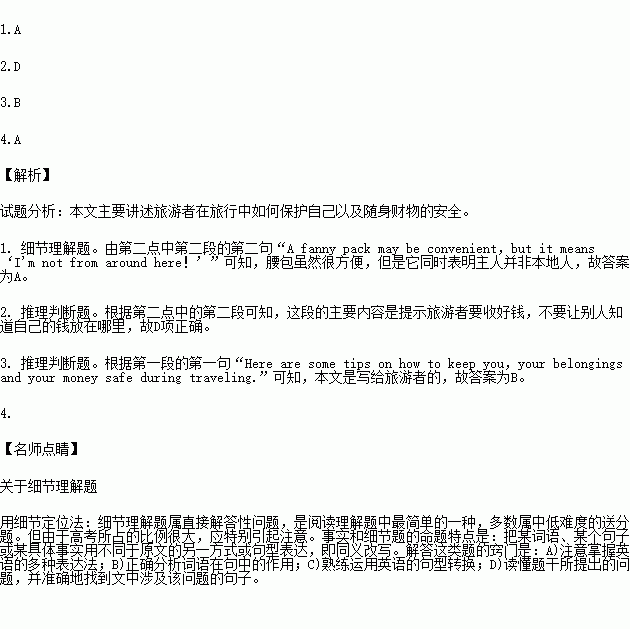题目内容
Here are some tips on how to keep you,your belongings and your money safe during traveling. After all,it'd be a shame to spend all that time finding the best price for your trip,only to lose your cash and credit cards to a thief.
Don't let others know that you are new here.
You're a tourist. You know that,but you don't want anybody else to know that. Don't unfold your big map on a busy corner. Don't ask strangers on the street for directions. Learn your route ahead of time,and step into a business for directions whenever possible. Avoid flashing your Lonely Planet guidebook around,or publicly referring to your language dictionary when traveling abroad.
Keep your friends close and your money closer.
A lone traveler equals easy pickings for a seasoned criminal. If you are traveling alone,try to hide that fact. Stick with groups whenever possible and keep information sharing with chatty cab drivers and the like to a minimum.
Another thing you don't want to advertise:where you keep your money. A fanny pack(腰包) may be convenient,but it means “I'm not from around here!” If you have a purse,keep it close to your body,preferably under an item of clothing like a jacket or a sweater so that thieves can't steal it. Be sure that your wallet is in a securely fastened pocket. Or go like 007 with a hidden money belt. How cool is that?
Be careful,even in your hotel room.
Never blindly answer a knock at your door. If the knocker identifies himself as a hotel employee,call the front desk to confirm. Always make sure your hotel door completely closes when entering or exiting.
Don't leave your valuables lying around when you leave for the day. That hotel safe is there for a reason!
1.Why shouldn't tourists wear a fanny pack?
A.Because it shows that you are not a person around here.
B.Because it is not convenient.
C.Because it can't be hidden under your jacket.
D.Because it can't hide money.
2.Why does the author mention 007's money belt?
A.To persuade readers to learn from 007.
B.To persuade readers to buy the belt worn by 007.
C.To persuade tourists to hide money in their belt.
D.To persuade tourists not to show others where you keep your money.
3.Who is this passage written for?
A.Locals.B.Tourists.C.Hotel owners.D.Thieves.
4.Which of the following is TRUE according to the passage?
A. When traveling abroad, you shouldn't open your language dictionary in public areas.
B. Try your best to travel alone.
C. If you hear a knock at your hotel door,go to open it.
D. You can leave your money at the hotel when traveling.

